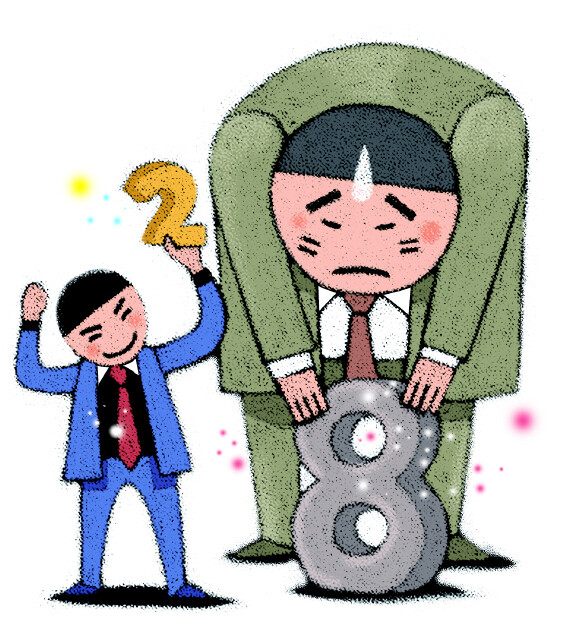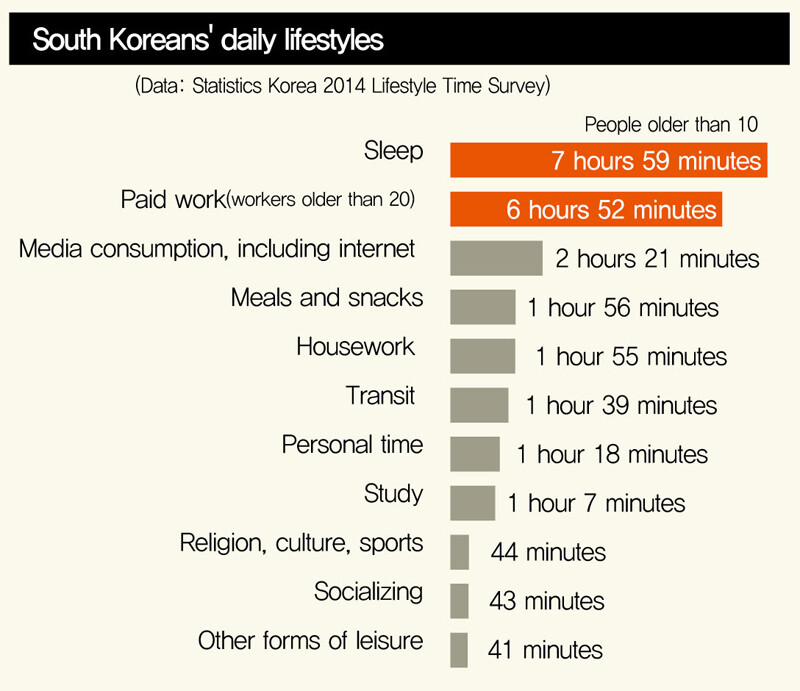hankyoreh
Links to other country sites 다른 나라 사이트 링크
Survey: 60% of S. Koreans don’t have enough time, 82% are tired

On an average day in 2014, South Koreans slept for 8 hours, ate for 2 hours, did housework for 2 hours, and worked for pay for 3 hours and 16 minutes (6 hours and 30 minutes for workers who were 20 years and above). They also were in transit for 1 hour and 40 minutes, studied for 1 hour, met other people for 40 minutes, and consumed media for 2 hours. 59.4% of respondents said that they didn’t have enough time, and 81.9% said that they felt tired.
According to the 2014 Lifestyle Time Survey, the results of which were announced by Statistics Korea on June 29, South Koreans spent 11 hours and 14 minutes on basic life activities (sleeping, eating, and other personal affairs), 7 hours and 57 minutes on work (paid work, housework, transit time, and studying), and 4 hours and 49 minutes on leisure activities (social life, consumption of media, religion, culture, and sports). This survey covered 12,000 households. A comparative study was carried out in 2009 on household members above the age of 10 from 8,100 households.

In the category of basic life activities, time spent sleeping increased 9 minutes from five years before to 7 hours and 59 minutes. Bedtimes were 11:24 pm during the week, 11:29 pm on Saturday, and 11:15 pm on Sunday. Time spent eating, another basic life activity, was 1 hour and 56 minutes, which was 11 minutes more than five years ago. Average meal times were 7:43 am for breakfast, 12:32 pm for lunch, and 7:09 pm for dinner.
The average time spent doing paid work each day was 3 hours and 16 minutes, which was one minute more than five years ago. Men worked 4 hours and 8 minutes, while women worked 2 hours and 26 minutes. Adults who were 20 years old or more worked an average of 4 hours and 24 minutes a day. The percentage of working people was 64.1%, and their average working time was 6 hours and 32 minutes.
The time spent on housework was 2 hours and 4 minutes on weekdays, 2 hours and 21 minutes on Saturdays, and 2 hours and 24 minutes on Sundays. The amount of time spent on housework was 47 minutes for men and 3 hours and 28 minutes for women. Men spent more time on housework on the weekends, with 39 minutes on weekdays, 1 hour and 1 minute on Saturdays, and 1 hour and 13 minutes on Sundays. No such difference was observed for women, who spent 3 hours and 25 minutes doing housework on weekdays, 3 hours and 37 minutes on Saturdays, and 3 hours and 33 minutes on Sundays.
The average time that students spent studying (including going to class) was 6 hours and 17 minutes. This was 32 minutes less than five years ago, a change resulting from the introduction of the five-day school week. By level of schooling, high school students spent the most time studying at 8 hours and 21 minutes, while university students spent the least time studying at 3 hours and 15 minutes. Middle school students studied for 6 hours and 1 minute, and elementary school students studied for 4 hours and 35 minutes.
The amount of time spent studying outside of school classes on weekdays was the longest for middle school students at 2 hours and 40 minutes and the shortest for university students at 1 hour and 49 minutes. Elementary school students studied outside of school for 2 hours and 14 minutes and high school students for 1 hour and 52 minutes. High school students studied for the longest amount of time, but the amount of time they spent studying outside of school was the shortest.
The time that South Koreans spent moving from one place to the other was an average of 1 hour and 39 minutes, 5 minutes fewer than five years ago. The commute to work was 26 minutes longer for men than for women, with men spending 1 hour and 34 minutes and women spending 1 hour and 8 minutes.
On the commute to school, university students spent the most time at 1 hour and 21 minutes, followed by high school students at 1 hour and 12 minutes, middle school students at 1 hour and 9 minutes, and elementary school students at 59 minutes.
The most popular way that South Koreans spend their leisure time is consuming media such as television and the internet, for an average of 2 hours and 21 minutes a day, with 44 minutes spent on religion, culture, and sports and 43 minutes on socializing. At an average of 1 hour and 55 minutes a day, watching television accounted for the greatest amount of leisure time. Women spent more time watching television on weekdays, and men spent more time watching television on weekends. The percentage of people at least 10 years of age who read books not related to their studies for at least 10 minutes a day was 10%, down 1.5% points from five years before.
By Kim Kyu-won, staff reporter
Please direct questions or comments to [english@hani.co.kr]

Editorial・opinion
![[Guest essay] Amending the Constitution is Yoon’s key to leaving office in public’s good graces [Guest essay] Amending the Constitution is Yoon’s key to leaving office in public’s good graces](https://flexible.img.hani.co.kr/flexible/normal/500/300/imgdb/original/2024/0416/8917132552387962.jpg) [Guest essay] Amending the Constitution is Yoon’s key to leaving office in public’s good graces
[Guest essay] Amending the Constitution is Yoon’s key to leaving office in public’s good graces![[Editorial] 10 years on, lessons of Sewol tragedy must never be forgotten [Editorial] 10 years on, lessons of Sewol tragedy must never be forgotten](https://flexible.img.hani.co.kr/flexible/normal/500/300/imgdb/original/2024/0416/8317132536568958.jpg) [Editorial] 10 years on, lessons of Sewol tragedy must never be forgotten
[Editorial] 10 years on, lessons of Sewol tragedy must never be forgotten- [Column] A death blow to Korea’s prosecutor politics
- [Correspondent’s column] The US and the end of Japanese pacifism
- [Guest essay] How Korea turned its trainee doctors into monsters
- [Guest essay] As someone who helped forge Seoul-Moscow ties, their status today troubles me
- [Editorial] Koreans sent a loud and clear message to Yoon
- [Column] In Korea’s midterm elections, it’s time for accountability
- [Guest essay] At only 26, I’ve seen 4 wars in my home of Gaza
- [Column] Syngman Rhee’s bloody legacy in Jeju
Most viewed articles
- 1[Guest essay] Amending the Constitution is Yoon’s key to leaving office in public’s good graces
- 2Faith in the power of memory: Why these teens carry yellow ribbons for Sewol
- 3[Editorial] 10 years on, lessons of Sewol tragedy must never be forgotten
- 4[Guest essay] How Korea turned its trainee doctors into monsters
- 5How Samsung’s promises of cutting-edge tech won US semiconductor grants on par with TSMC
- 6US grants Samsung up to $6.4B in subsidies for its chip investments there
- 7[News analysis] Watershed augmentation of US-Japan alliance to put Korea’s diplomacy to the test
- 8Korea ranks among 10 countries going backward on coal power, report shows
- 9[Column] A death blow to Korea’s prosecutor politics
- 10K-pop a major contributor to boom in physical album sales worldwide, says IFPI analyst